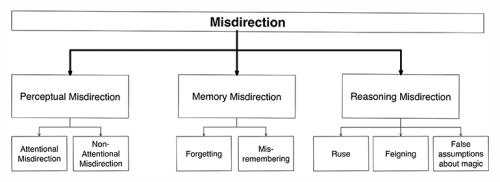Taxonomies Of Misdirection Overview

Taxonomies of misdirection overview
When confronted with a magic trick, you first perceive the relevant sensory information, then store key aspects of it in your memory, and then perhaps use this to reason about how the trick was done. A magician can prevent a spectator from discovering the method by simply manipulating any one of these processes.
These categories define misdirection in terms of the psychological mechanisms affected. The first set of principles manipulate your perception, preventing you from perceiving selected parts of the performance.
—Gustav Kuhn, Experiencing the Impossible
More Posts from Sigilheart and Others

David Allen Hulse, The Eastern Mysteries—An Encyclopedic Guide to the Sacred Languages & Magickal Systems of the World


Hegel’s Dialectics
Dialectics drives to the “Absolute”,… which is the last, final, and completely all-encompassing or unconditioned concept or form in the relevant subject matter under discussion (logic, phenomenology, ethics/politics and so on). The “Absolute” concept or form is unconditioned because its definition or determination contains all the other concepts or forms that were developed earlier in the dialectical process for that subject matter…We can picture the Absolute Idea, for instance—which is the “Absolute” for logic—as an oval that is filled up with and surrounds numerous, embedded rings of smaller ovals and circles, which represent all of the earlier and less universal determinations from the logical development. [Fig. 1].
Since the “Absolute” concepts for each subject matter lead into one another, when they are taken together, they constitute Hegel’s entire philosophical system, which, as Hegel says, “presents itself therefore as a circle of circles”. We can picture the entire system like this [Fig. 2].

The Atomic Ladder of Life, from solid to liquid to gaseous to etheric to spirit. From The Gate Beautiful by John Ward Stimson, 1903.

Jack R. Strange, "A Search for the Sources of the Stream of Consciousness", The Stream of Consciousness: Scientific Investigations into the Flow of Human Experience
The Internet adores this second-person voice. There it is, at every cyber–street corner: Recommended for You, Suggestions for You, Here Is Something You Might Like. Behind each of these You’s, an algorithm sits at an easel, squinting, trying to catch Your likeness. But these algorithms are true Renaissance practitioners. Not only portraitists, they’re also psychologists, data-crunchers, and private detectives, extrapolating personality from the evidence of our past actions: from our online histories and, increasingly, from what they can eavesdrop, without any meaningful warrant, in the physical world. From all those toothsome bytes of behavior, they create an image of You.
Laurence Scott, "Hell is Ourselves"

— Ursula K. Le Guin, from “A Rant About ‘Technology’”

Dialectics: Being-Nothing-Becoming
When we think Being it immediately is Nothing, and Nothing is immediately Being. The very thinking of them is their vanishing, and thinking is what a thought truly is. It is no logical nonsense to say the truth we have experienced: Being is Being vanishing to Nothing, and vice versa.
-
 sigilheart reblogged this · 1 month ago
sigilheart reblogged this · 1 month ago -
 slightsoft liked this · 7 months ago
slightsoft liked this · 7 months ago -
 space-samurai-x reblogged this · 1 year ago
space-samurai-x reblogged this · 1 year ago -
 indulgedandbruised liked this · 1 year ago
indulgedandbruised liked this · 1 year ago -
 hookedonyonics liked this · 1 year ago
hookedonyonics liked this · 1 year ago -
 fka310 liked this · 1 year ago
fka310 liked this · 1 year ago -
 jamiefoxxhairline reblogged this · 1 year ago
jamiefoxxhairline reblogged this · 1 year ago -
 leylasizlik liked this · 3 years ago
leylasizlik liked this · 3 years ago -
 natalalienation liked this · 3 years ago
natalalienation liked this · 3 years ago -
 chuesong-eyo liked this · 3 years ago
chuesong-eyo liked this · 3 years ago -
 theseasonedescapist liked this · 3 years ago
theseasonedescapist liked this · 3 years ago -
 s4ge1avender liked this · 3 years ago
s4ge1avender liked this · 3 years ago -
 bunnybugs liked this · 3 years ago
bunnybugs liked this · 3 years ago -
 funeral reblogged this · 3 years ago
funeral reblogged this · 3 years ago



